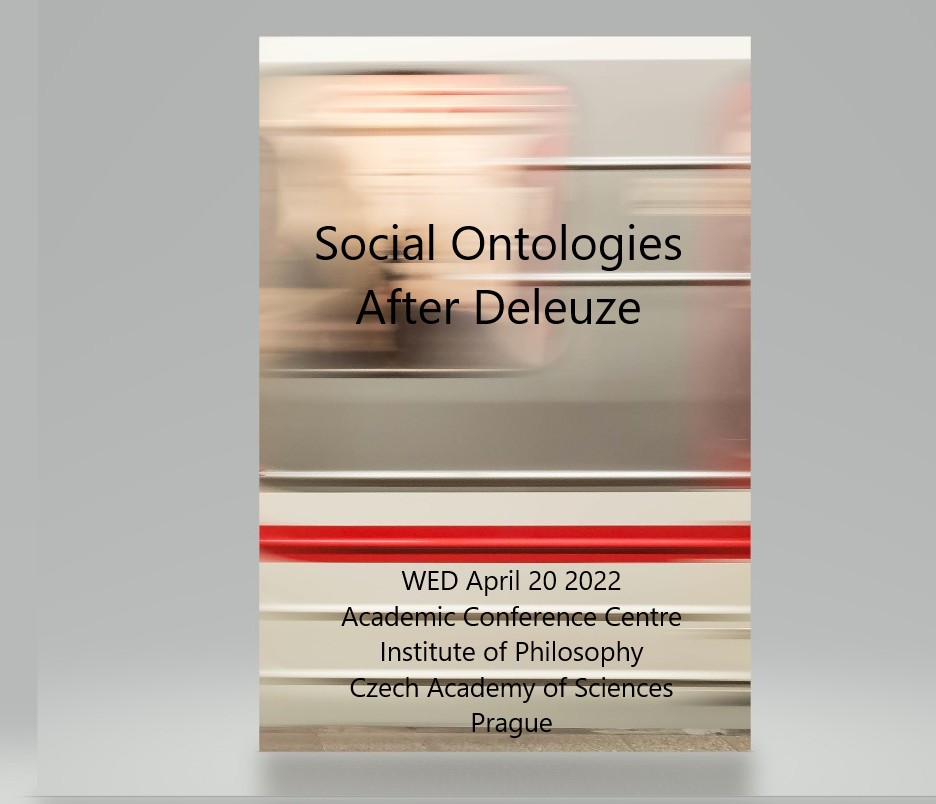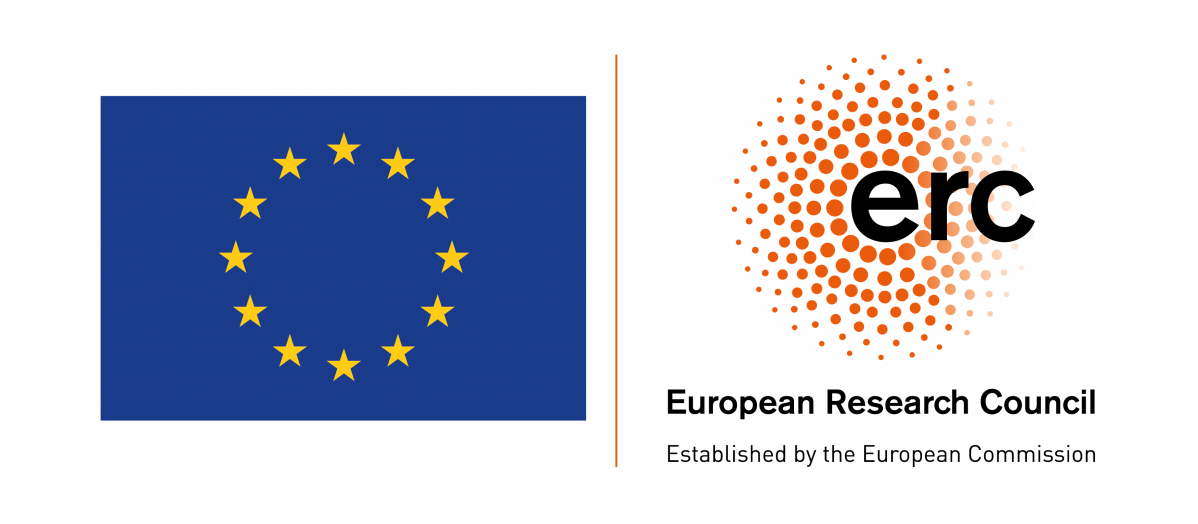Social Ontologies After Deleuze Organized by the Department of Contemporary Continental Philosophy, Institute of Philosophy, Czech Academy of Sciences
Programme
Programme
10:00-10:50 Ian Buchanan: Deleuze and Guattari’s Differential Method
10:50-11:00 coffee break
11:00-11:50 Michaela Fišerová: Going Viral: Affective Haecceities on Social Networks
11:50-12:00 coffee break
12:00-12:50 Petr Prášek: Deleuze, Phenomenology, and the Indispensability of the Ethics of the Event
12:50-14:00 lunch break
14:00-14:50 Janae Sholtz: Interrogating the Cartographies of New Materialist Feminism: The Linguistic Turn, the Posthuman and the Transcontinental Divide
14:50-15:00 coffee break
15:00-15:50 Anthony Faramelli: Institutional Cartographies: Analyzing the Social After Guattari and CERFI
15:50-16:00 coffee break
16:00-16-50 Petr Kouba: War in Ukraine, Fascism and Anti-Fascism
Biographies
Prof. Ian Buchanan lectures at University of Wollongong. His previous position was Professor of Critical and Cultural Theory at the Centre for Critical and Cultural Theory at Cardiff University.
Ian Buchanan has published on a wide variety of subjects across a range of disciplines, including literary studies, cultural studies, communications studies and philosophy. He has published on film, literature, music, space, the internet and war as well a number of other subjects. He is the author of the Oxford Dictionary of Critical Theory and the founding editor of the international journal Deleuze Studies. He is also the editor of four book series: Deleuze Connections (EUP), Critical Connections, Plateaus (EUP) and Deleuze Encounters (Continuum). His publications include Michel de Certau: Cultural Theorist (SAGE Publications, 2000), Deleuze: A Metacommentary (Edinburgh University Press, 2000), Fredric Jameson: Live Theory (Continuum, 2006), Deleuze and Guattari's Anti-Oedipus (Continuum, 2008), Assemblage Theory and Method: An Introduction and Guide (Bloomsbury Academic, 2020), The Incomplete Project of Schizoanalysis: Collected Essays on Deleuze and Guattari (Edinburgh University Press, 2021).
Doc. Michaela Fišerová Ph.D. works in the fields of philosophy and aesthetics, she specializes in postructructuralism, especially Derrida´s and Deleuze´s philosophy. She has earned her M.A. in Aesthetics at Université Paris8, her Ph.D. in Political Philosophy at Université Paris7, and her habilitation in Philosophy at Masaryk university. In the recent years, she has been lecturer and researcher at Charles University in Prague, Masaryk University in Brno, Metropolitan University Prague and Academy of Performing Arts in Prague. In her early book Sharing the Visible: Rethinking Foucault (L´Harmattan, 2013), she examined two historically different visualities in order to understand the relationship between visual representation of events and their political (mis)recognition in documentation. Her book Deconstructing Signature (Prague, 2016) came out of her GAČR-supported research project. She proposed to deconstruct three metaphysical expectations of handwritten signature – similarity, authenticity, and repeatability – as a triple aporia trapped in the interval between life and law. In her book Fragmentary Vision: Rancière, Derrida, Nancy (Prague, 2019), she proposed an innovative insight into the “fragmentary” practice of photographic representation by arguing that it is possible to take a photograph of a memory, if that “memory” is metonymically composed out of fragments of present perceptions. In her book Deleuze on Literature: Between Art, Animality and Politics, co-written with Gregg Lambert and Martin Charvát, she examined crucial differences in Deleuze´s and Derrida´s reading of Kafka´s "animal" stories. In her last book Event of Signature. Jacques Derrida and Repeating of the Unrepeatable (SUNY Press, 2022), she returned to the problem of handwritten signature to question the metaphysical expectation to repeat the unrepeatable event of handwriting.
Dr. Petr Prášek is a postdoc researcher at the Department of Contemporary Continental Philosophy of the Institute of Philosophy, Czech Academy of Sciences. In 2019, he received his Ph.D. in philosophy from the Université Paris 1, Panthéon-Sorbonne, France, and Charles University in Prague, Czech Republic (supervisors: prof. R. Barbaras, prof. M. Petříček). His Ph.D. thesis, Le devenir-autre de l’existence. Essai sur la phénoménologie contemporaine, was awarded the Bolzano Prize by the President of Charles University in 2020.
He published a Czech monograph on Gilles Deleuze’s philosophy, Člověk v šíleném dění světa: Filosofie Gillesa Deleuze, and several articles on contemporary French phenomenology. All these texts deal with the analysis of the becoming-other of human existence. In his current project, Petr Prášek is extending his research and focusing on meta-ethical implications of the dynamic descriptions of existence: he attempts to apply the results of contemporary French phenomenology to actual problems such as ecological issues or fake news.
Dr. Janae Sholtz lectures at Alvernia University. She is the author of The Invention of a People, Heidegger and Deleuze on Art and the Political (Edinburgh Press, 2015), and the editor of Deleuze and the Schizoanalysis of Feminism: Alliances and Allies for Bloomsbury and a special journal edition entitled Infinite Eros: Deleuze, Guattari, and Feminist Couplings. Janae Sholtz has published research in the areas of continental philosophy, feminist theory, philosophy of art, and social and political philosophy. She has written articles for Evental Aesthetics, Deleuze and Guattair Studies, Journal of Continental and Comparative Philosophy, phioSOPHIA and is currently co-editing a book on Contemporary French Philosophy and Stoicism.
Dr Anthony Faramelli is a psychosocial researcher and practitioner. He is lecturer in Visual Cultures at Goldsmiths, University of London where he co-leads the BA in Fine Art and History of Art. Anthony also works as a mental health recovery programme consultant and reflective practice facilitator. He is a member of the Executive Board of the Association for Psychosocial Studies and is a founding member of the Network for Institutional Analysis.
Anthony Faramelli is the author of Resistance, Revolution and Fascism: Zapatismo and Assemblage Politics (Bloomsbury 2018) and an editor, with David Hancock and Rob White, of Spaces of Crisis and Critique: Heterotopias Beyond Foucault (Bloomsbury 2018). He is currently completing a monograph provisionally titled The Mass Psychology of Fascism in the Age of Machines: Big Data, Surveillance and Control.
Dr. Petr Kouba studied philosophy at the Faculty of Arts, Charles University in Prague, and received PhD at the same department in 2006. During his postgraduate study, he was awarded several fellowships: at the Universität Zurich (2000 - 2001), Duquesne University in Pittsburgh (2001 - 2002), and the Université de Lausanne (2003-2004). After receiving PhD, he lectured at the Anglo-American College in Prague and in the international program CERGE-EI at the Charles University. Besides being a researcher at the Institute of Philosophy, he lectured philosophy at the Departement of Philosophy and Religious Studies of the Faculty of Arts, Charles Universtity in Prague between 2006 - 2016. He is an author of the books Fenomén duševní poruchy. Perspektivy Heideggerova myšlení v oblasti psychopatologie, which was translated to English (Springer, 2015) and German (Königshausen-Neumann, 2012). He published another two monographies: Margins of Phenomenology (Verlag T. Bautz, 2020), and L'exode sans Moise: L'émigration rom comme probléme politique (Verlag T. Bautz, 2021). He also co-edited three collective monographies: Dynamic Structure: Language as Open System, Medicína v kontextu západního myšlení, and Franz Kafka: Minority Report.
Abstracts
Abstracts
Ian Buchanan: Deleuze and Guattari’s Differential Method
In the opening pages of Anti-Oedipus, we are told that the desiring-machine, the forerunner to the assemblage, does two things: it sets flows in motion, and it disrupts flows. “For every organ-machine, an energy-machine: all the time, flows and interruptions.” Despite its prominence, this key aspect of Deleuze and Guattari’s conception of the assemblage has largely been overlooked or ignored by assemblage theory as it has developed over the last two decades. Yet in the absence of a notion of flow, it is difficult to grasp what Deleuze and Guattari mean by saying desire is productive. This, in turn, makes it difficult to grasp what they mean when they say there is no desire but assembling, assembled, desire”. Isolated from its fundamental relation to flow, it is easy to see how the concept of the assemblage has come to be understood as the ‘assembling’ of some kind of self-contained entity, when in fact it should be understood as an apparatus of capture and extraction engineered to engage with a specific type of flow. Factoring flow into how we think with and use the concept of the assemblage gives it an analytic dimension it otherwise lacks because it requires the application of what Deleuze and Guattari refer to as a “differential method”.
Michaela Fišerová: Going Viral: Affective Haecceities on Social Networks
How can an authoritarian state control internet by making internet users misuse internet? To answer this question, I propose to revise Deleuze and Guattari’s concepts of the smooth space and the striated space in relation to contemporary public space accessible online. In my reading of A Thousand Plateaus, I will focus on dangers of the smooth collapsing of into the striated, especially on the threat of fascist war machine driven by common desire of masses. By examining the case of Russian troll farms spreading disinformation and fake news, I will explain the participatory role of virtual communities, understood as affectively united haecceities. Paradoxically, by making fake news go viral, affective haecceities help to turn the “smooth” interconnectivity of social networks into promotion of the “striated” authority of state interests.
Petr Prášek: Deleuze, Phenomenology, and the Indispensability of the Ethics of the Event
As is well known, Deleuze reproaches Husserl, Heidegger, Merleau-Ponty, and other classical phenomenologists for having burdened their descriptions of experience with structures derived from the empirical (in which the world is differentiated into objects of consciousness). His transcendental empiricism, by contrast, investigates the very genesis of the empirical within the immediate flow of an asubjective transcendental field. However, both Deleuze in his texts and Deleuzian literature dealing with his relationship with phenomenology almost completely ignore contemporary French phenomenology focusing, similarly to Deleuze, on the eventful dimension of appearing (événementialité d’apparaître). The article examines the intersections between contemporary phenomenology in France (Maldiney, Richir, Marion, Barbaras, Romano) and Deleuze’s metaphysics with regard to the question common to Husserl, Deleuze and contemporary phenomenology: that of the crisis of humanity and its solution. Its main thesis is that contemporary French phenomenology should make another – Deleuzian – step and develop its own version of the ethics of the event.
Janae Sholtz: Interrogating the Cartographies of New Materialist Feminism: The Linguistic Turn, the Posthuman and the Transcontinental Divide
Discussions of new materialism often begin by opposing its theoretical imperatives or interventions to traditional philosophical lineages. Particularly with its divergence from the linguistic turn and social constructionist frameworks, this manner of introduction has become something of a founding narrative. New materialist feminists, who call attention to the gendered nature of the elision and denigration of materiality, perform a similar injunction with respect to feminism itself. Thus, a pattern emerges from the foundational gestures of new materialism: a prevalent desire to produce a cartography, or several, of new materialism’s relation to what it is not. These cartographies, as well as the use of cartography itself, introduce the contours of this intellectual movement. This presentation traces several of these cartographies beginning with the location of new materialism in relation to the linguistic and cultural turns, followed by the image of the feminist terrain from which new materialist feminists delineate themselves, I.e. the Transatlantic divide, and, finally, the relation between new materialism and Posthumanism. The interrogation of these liminal zones of interpretation, creation, fidelity, and transformation guides this project as a whole – not that we shouldn’t creatively transform or utilize concepts, but that we also have to do justice to the specific sense of the concepts that we are appropriating and should be aware of what is lost when we lay claim to them or make appeals to them. It is with this spirit that I engage the cartographies of new materialism, keeping these questions in mind: “how do these cartographies carve up the terrain and carve out a territory?” and “what are the desires involved in carving out a territory in the first place?”. Effectively, I am interested in assessing the costs and the consequences for feminism of meteoric rise of new materialism.
Anthony Faramelli: Institutional Cartographies: Analyzing the Social After Guattari and CERFI
Institutional analysis was the theoretically informed practice of Le Centre d'études, de recherches et de formation institutionnelles (CERFI). Active between 1967 and 1987, CERFI was founded by Félix Guattari and was made up of about twenty sociologists, urbanists, economists, psychologists, pedagogues and activists. They met every week and worked in general assemblies and small thematic groups. CERFI maintained their independence by acting as consultants working on contract, which allowed them to resist the tendency to become civil servants, academics, union party bureaucrats.
Starting with the position that the institution is the mechanism that produces sociality, institutional analysis was foundational in Deleuze and Guattari’s collaborative thought and remains one of the most radical approaches to analysing the social. However, it nevertheless remains significantly under-researched. This talk will explore the theory and practice of institutional analysis, its influence on the collaborative thought of Deleuze and Guattari and its continued application.
Petr Kouba: War in Ukraine, Fascism and Anti-Fascism
The current war in Ukraine forces us to rethink the problem of fascism that was used as a pretext for this war and repeatedly appears in the war rhetoric. It is this problem that was exemplary examined by Wilhelm Reich in The Mass Psychology of Fascism. Reich seeks to elucidate craving for authority, mysticism and ascetic moral that turn masses against their vital interests. According to him, masses ignore their own interests and fall prey to their irrational and reactionary desires. The irrational and reactionary desires are thus placed in opposition to rational and revolutionary interests. However much Deleuze and Guattari appreciate Reich’s analysis of fascism, they accept neither his opposition of revolutionary interests and reactionary desires, nor his romantic view on homo natura that resists the destructive influence of technocratic civilization with all its ideologies and manipulative strategies. Instead, they introduce a much subtler differentiation of desires and interests as well as a schizophrenic image of homo natura. This is why we can find, in their Anti-Oedipus, not only a new view on fascism that surpasses limits of Reich’s conception, but also new strategies for anti-fascist life. This examination is further developed in A Thousand Plateaus, where we are confronted with a subtle differentiation of totalitarianism and fascism. While Reich believed Stalinism and Hitlerism had the same common denominator, Deleuze and Guattari show the difference between the state apparatus of totalitarianism and the destructive war-machine of fascism. The aim of this paper is to connect the above mentioned reflections with the insights drawn from Malabou´s traumatopolitics and Nancy´s ontological analysis of our co-existence. What brings Malabou and Nancy together is surprisingly the phenomenon of event. When Malabou uncovers trauma as a main factor of modern politics, she speaks of traumatic events, rather than traumatic experiences. Nancy, to the contrary, grasps our very co-existence with others in terms of event. But the limit situation of such event is for him represented by urbicide which destroys the very condition of our co-existence replacing its plurality by a social desert. Thus, it appears that a thorough analysis of fascism needs to be accompanied by a reflection of traumas and limits of our very co-existence when it comes to urbicide of Mariupol as well as countless examples of individual and collective traumas caused by Russian invasion of Ukraine.






